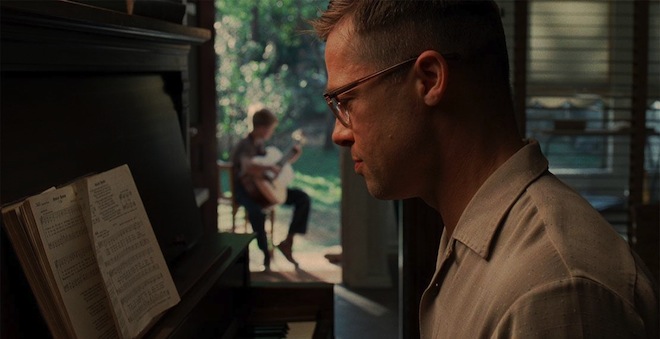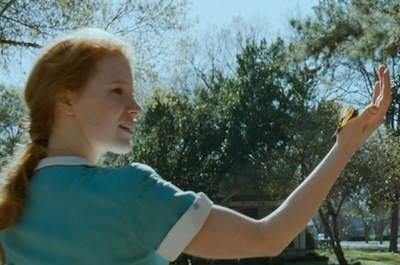The Tree of Life carried off the Palme d'Or at Cannes ... A momentous and portentous film ... Brad Pitt is wonderful as the complex, conflicted family man in search of the American dream ... Miss Lumière seems to like it (apart from a bit of Christian tub-thumping)
 You have to hand it to Terrence Malick. He has to be only living filmmaker who wants to make cinema dealing with all the big questions - the mystery of life, the miracle of existence, fathers and sons, husbands and wives, the nature of love, the power of nature, faith, death, grief, God, reconciliation, fate, the American Dream and the meaning of grace.
You have to hand it to Terrence Malick. He has to be only living filmmaker who wants to make cinema dealing with all the big questions - the mystery of life, the miracle of existence, fathers and sons, husbands and wives, the nature of love, the power of nature, faith, death, grief, God, reconciliation, fate, the American Dream and the meaning of grace.
While Malick's ambitions have always been grand - Days of Heaven (1978) dealt with a romance of epic import and The Thin Red Line (1998) with men at war - he doesn't always bring it off.
Nevertheless, the Malickian view of the world is unique. In his first feature in six years, the famously reclusive writer-director has attempted nothing less than a search for meaning.
He does so by exploring the lives of one family in Waco, Texas, in the fifties.
Casting the still pulchritudinous Brad Pitt as the father (Mr O'Brien) is a stroke of genius. Not only does he look like the man most likely to succeed in prosperous, post-war America, he has the ability to convey a complex, conflicted personality.
He can be a brute, demanding absolute obedience from his sons, while also playing the piano and the church organ with great sensitivity.
O'Brien has completely fallen for the American Dream yet ends up a bitter disappointment to himself.
 Mr O'Brien: losing the American Dream
Mr O'Brien: losing the American Dream
How that affects his relationships with his family is finely wrought by the actor, but sometimes overwrought by the director.
And that's really the problem with this visually stunning film - a fervent desire to be momentous.
A magnificent sequence showing the creation of the earth is almost ruined by giving it too much time and far too much choral music from the Christian canon.
It's all a bit (Roman) Catholic for this viewer's tastes.
 Jessica Chastain as Mrs O'BrienPortentous voice-overs used to express the inner workings of the characters don't always work and often sound excruciatingly pretentious.
Jessica Chastain as Mrs O'BrienPortentous voice-overs used to express the inner workings of the characters don't always work and often sound excruciatingly pretentious.
Sean Penn as the tortured grown-up eldest son (Jack O'Brien) is a case in point.
Much meaning is lost in the soundtrack as he wanders through various bleak landscapes of the soul - surely not something the director intended.
What Malick does portray brilliantly are the rhythms of family life in small-town, fifties America.
Like a dream remembered - Malick grew up in Waco - he captures the aimlessness of childhood, the agonies of growing-up and the fragility of esteem.
The performances are all excellent, despite the many soundless gazes, full of intent.
It's a long film - over two hours - made longer by what appears to be not a lot of plot and quite a lot of rumination, albeit beautifully written and impressionistically imagined.
The major dramatic event - the death of a son, quite possibly in Vietnam - occurs early in the film.
The rest seems to be concerned with understanding not only what death means, but also life.
I was hoping to see a film made by a philosopher - Malick's metier before he discovered movies.
Unfortunately, what he delivered is film made by a Christian.
Miss Lumière